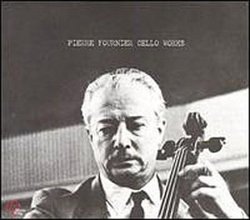| All Artists: Tchaikovsky, Susskind, Camille Saint-Saens, Pierre Fournier Title: Pierre Fournier: Cello Works Members Wishing: 0 Total Copies: 0 Label: Qualiton Imported Labels Release Date: 11/21/2000 Album Type: Import Genre: Classical Styles: Chamber Music, Forms & Genres, Concertos, Historical Periods, Classical (c.1770-1830), Modern, 20th, & 21st Century, Instruments, Strings Number of Discs: 3 SwapaCD Credits: 3 UPCs: 675754295622, 8808513000744 |
Search - Tchaikovsky, Susskind, Camille Saint-Saens :: Pierre Fournier: Cello Works
 | Tchaikovsky, Susskind, Camille Saint-Saens Pierre Fournier: Cello Works Genre: Classical
This three-disc set gives a fine overview of Fournier's consummate artistry and stylistic versatility. His playing is characterized by a splendid, but never showy technique; a warm, sonorous tone whose beauty and express... more » |
Larger Image |
CD Details
Synopsis
Amazon.com
This three-disc set gives a fine overview of Fournier's consummate artistry and stylistic versatility. His playing is characterized by a splendid, but never showy technique; a warm, sonorous tone whose beauty and expressiveness come through clearly even on these reissues; and a refined, patrician nobility. The Saint-Saëns Concerto is poetic, intense, and charming, and he even keeps "The Swan" from sounding sentimental. The Schubert is unusually fast, but flexible and wistful; the Tchaikovsky is brilliant, romantic, expansive, lush in tone and sentiment. The original recordings were made between 1939 and 1947, and the sound shows its age. The set's high point is the performance of the Beethoven Sonatas with Artur Schnabel, famous as a Beethoven interpreter with an entirely different style: free, unbridled, daring technically and emotionally. However, the collaboration is wonderful. The two musicians bring out the best in each other, with Fournier exercising a restraining influence, Schnabel a liberating one. They also bring out everything that's in the music: the depth, grandeur, drama, passion, impetuosity, lyricism, graciousness, serenity, wit, and humor. Their tempos flow, yet there is a sense of expansive, leisurely time. Every detail counts, the phrasing is clear and elegant, transitions and liberties are poised, character and contrasts strongly delineated, the running piano passages ripple and surge. The original recordings date from 1947 and 1948; sound and balance are excellent. --Edith Eisler

 Track Listings (7) - Disc #1
Track Listings (7) - Disc #1